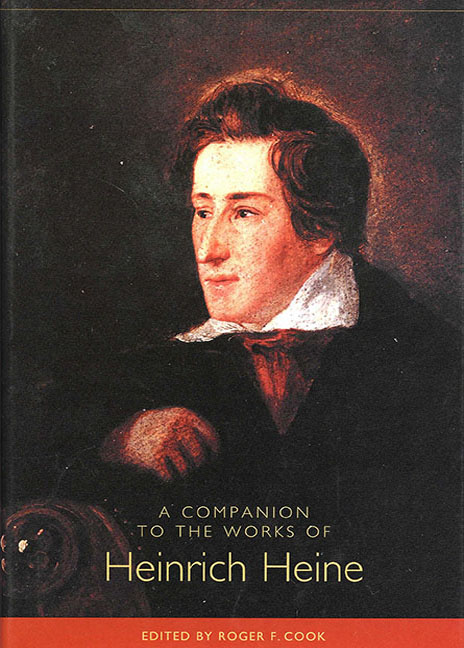Book contents
- Frontmatter
- Contents
- Acknowledgments
- Chronology of Heine's Life
- Heine's Major Works
- List of Abbreviations
- Introduction
- The Romantic Poet
- Illusions Lost and Found: The Experiential World of Heine's Buch der Lieder
- A Walk on the Wild Side: Heine's Eroticism
- The Riddle of Love: Romantic Poetry and Historical Progress
- Philosophy, History, Mythology
- Religion, Assimilation, and Jewish Culture
- Modernity: Views from the Poet's Crypt
- Reception in Germany
- Notes on the Contributors
- Index
The Riddle of Love: Romantic Poetry and Historical Progress
from The Romantic Poet
Published online by Cambridge University Press: 29 July 2017
- Frontmatter
- Contents
- Acknowledgments
- Chronology of Heine's Life
- Heine's Major Works
- List of Abbreviations
- Introduction
- The Romantic Poet
- Illusions Lost and Found: The Experiential World of Heine's Buch der Lieder
- A Walk on the Wild Side: Heine's Eroticism
- The Riddle of Love: Romantic Poetry and Historical Progress
- Philosophy, History, Mythology
- Religion, Assimilation, and Jewish Culture
- Modernity: Views from the Poet's Crypt
- Reception in Germany
- Notes on the Contributors
- Index
Summary
It is not easy to say why Heine wrote Romantic poetry. On the face of it, there are some factors that seem obvious. When he first began to pursue or at least envision for himself a career as a literary writer (sometime around 1816), Romanticism was at its peak in terms of the broad public perception of it as the cutting edge of cultural innovation and visionary insight, but was already in decline as a revolutionary cultural movement that was challenging the status quo in German literature. As is perhaps the case for most aspiring writers, Heine wanted to stake his claim to creative genius and win the grand psychic boost, as well as ambivalent social promotion, that accompany it. There is probably no better marker of the status granted to a German poet at the time than the wide and lasting fame gained by Mde. de Staël's assertion that Germany is a land of (romantically inspired) “Dichter und Denker.” Without doubt, “Heine wanted to be a poet” (Sammons 60), and at that time to be a German poet meant to be a Romantic poet. Regardless of how one resolves the question “Why?,” he became a German Romantic poet and persisted in this identity, in one form or another, until the end.
Consequently, Romantic poetry became a key discourse for his inquiries into human existence and his medium for contributing to European culture's collective pursuit of self-knowledge. This remains true for Heine even after Romanticism had ceased to be the dominant force in German culture. Even when he saw himself, in his own never modest estimation of his place in German poetry, as the initiator of a modern German lyric that had supplanted Romantic poetry, he declared himself to be nothing other than a “romantique défroqué” (B 6.1: 447). But one could also claim that he already considered the poetic idiom of Romanticism antiquated at the time of his first great successes in the Romantic manner in the early 1820s. As Heine scholars have argued frequently, his own harsh form of irony in Buch der Lieder undermines the very essence of the Romantic ideal and draws into question the language, the vision, the voice, and ultimately the viability itself of Romantic poetry as a literary discourse.
- Type
- Chapter
- Information
- A Companion to the Works of Heinrich Heine , pp. 105 - 136Publisher: Boydell & BrewerPrint publication year: 2002

